Some types of grass spread more aggressively than others. Bermuda grass is a hardy, heat-tolerant grass that spreads by both rhizomes and stolons. This means that it can spread both above ground and via roots underground, which is terrific if you want a full, lush lawn of Bermuda grass. However, it is not so great if your lawn is primarily Tall Fescue or Zoysia. In this case, Bermuda grass is an unwelcome invader, and it can be very tough to get rid of, due to its resilient nature. It may take several seasons, an investment in different products, and a whole lot of patience, but despite what many think, it is possible to get rid of Bermuda grass without harming your lawn.
Killing Bermuda grass in and around your lawn without harming it will require a chemical herbicide. Alternatively, patches of Bermuda grass can be treated by suffocation or solarization.
Preventing Bermuda Grass from Invading your Lawn
Bermuda grass is tough to get rid of once it has taken root in your yard. To defend your lawn from an invasion, it is important to fertilize, water, and care for your lawn so that it can grow a deep and thick root system. A thick, healthy lawn leaves less room for weeds or unwanted grasses such as Bermuda.
When mowing, be careful not to clip your grass too short. If there are sightings of Bermuda grass in the surrounding area, bag your clippings. Bagging clippings is always a good idea when trying to prevent the spread of anything throughout your lawn.
Pro Tip! Letting your grass grow longer will force the Bermuda to grow upwards instead of outwards. This will not only slow the spread of Bermuda, but will also damage the weed when you mow.
There is also an ingredient called Siduron, which prevents new seeds from taking root. This preventative measure, when used a few years in a row successively, could also be a solution. The cycle of Bermuda grass growth will be slowed if it cannot reproduce seeds – but it may not kill it off completely, as Bermuda does not rely on reseeding alone. An example of a product using Siduron is Gordon’s Tupersan, shown below.
Gordon’s Tupersan
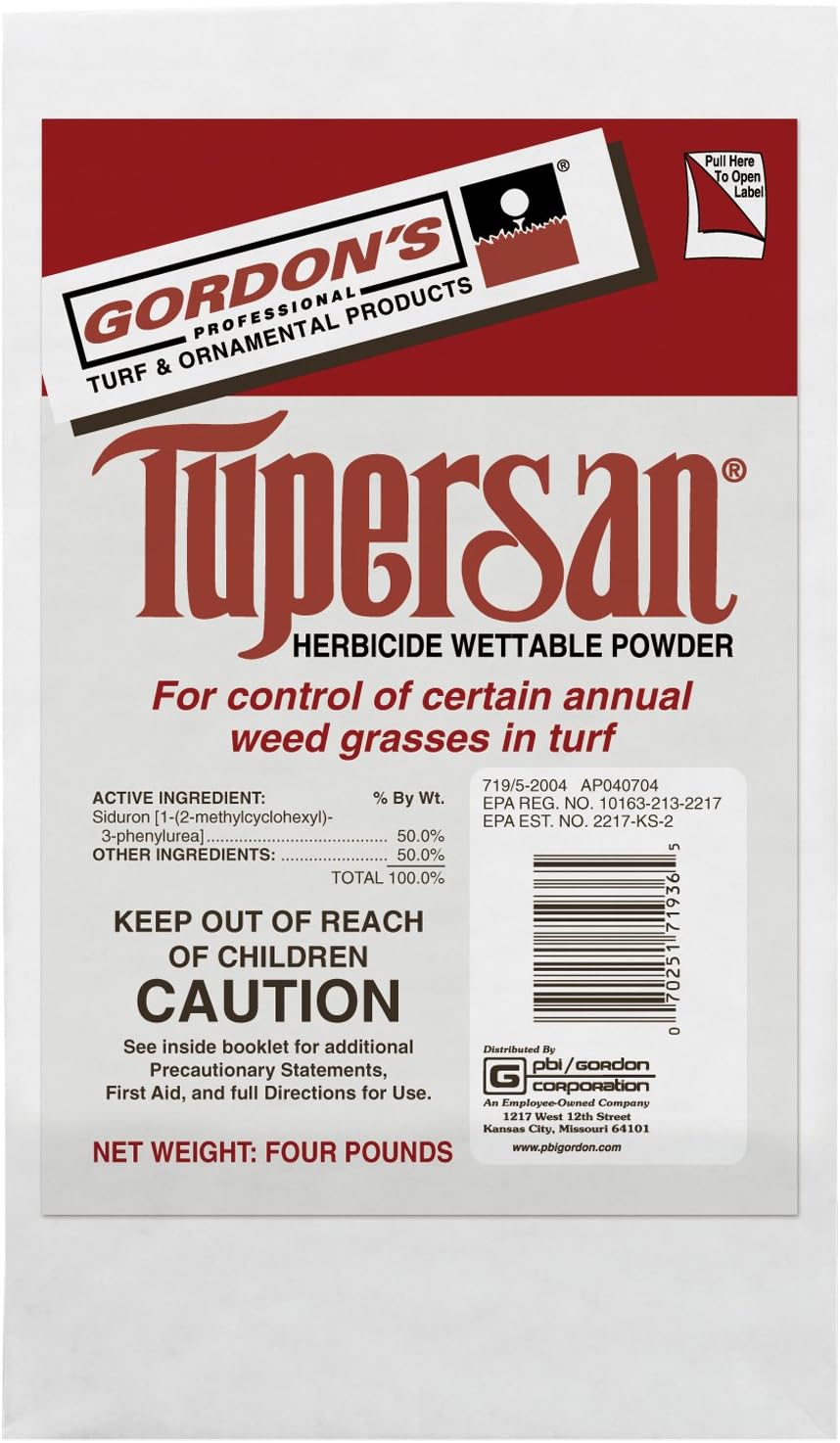
- 50% Siduron
- Preventative to stop encroachment of Bermuda grass on your turf
- Safe for Kentucky bluegrass, Tall Fescue, Bentgrass, most common cool-season grasses, and Zoysia
- Can be used in combination with seeding
- Also prevents Crabgrass
Best Products for Killing Bermuda Grass
When looking for a herbicide that will get rid of Bermuda grass in your lawn, you need to be careful not to use a product that will harm the existing grass. This means you need a selective herbicide. A selective herbicide will only target the weed by sticking to the blades, interfering with its ability to photosynthesize, killing it down to the root.
If Bermuda grass has completely taken over your yard and you plan to reseed anyway, take a more aggressive approach and use a non-selective grassy weed killer. Here are a few of the top-rated products for killing Bermuda grass.
Selective
Norman’s Ornamec 170

This selective grassy weed killer boasts that it works on Bermuda grass without damaging your lawn. In addition, it will combat goosegrass, crabgrass, quack grass, and many more pesky weeds. One application will coat the leaves and stop them from photosynthesizing. The entire process can take up to a few weeks, and many reviewers recommend a reapplication about 2 – 3 times a season.
The best herbicide for getting rid of Bermuda grass in Kentucky Blue Grass!
When used in the proper dosage, Ornamec 170 will not harm Zoysia or Kentucky Bluegrass, although if it is applied during hot, dry weather, it may cause a slight discoloration. All in all, the risk of a little discoloration is worth it in order to get rid of a large amount of invasive Bermuda, and as soon as your lawn is no longer stressed, it should bounce back.
This product is generally found as the go-to for selective elimination of Bermuda grass.
Fusilade II Ornamental Herbicide

Another great product for killing Bermuda without harming other perennial turfs such as Tall Fescue and Zoysia Grass is Fusilade. The concentration in the formula is very high, so if your lawn is a little stressed from heat, consider diluting this herbicide even more than the label indicates. You can always go back over and respray your lawn near the end of the season if it doesn’t affect all the Bermuda the first time.
The best herbicide for getting rid of Bermuda grass in a lawn of Tall Fescue or Zoysia!
Remember to add a surfactant or a bit of dish soap to help the herbicide stick to the leaves. Results will begin to show after about one week, but wait three weeks before being entirely sure you have successfully killed the Bermuda grass.
This product is also safe to use around the garden and ornamental plants.
Non selective
Spectracide Weed and Grass Killer

This herbicide, being non-selective, will kill pesky Bermuda grass down to the root along with every other living green thing in its path. This is a good solution if your lawn is entirely overrun by Bermuda grass, and you have given up hope on saving your original lawn turf. Luckily this solution allows you to reseed your lawn just weeks after killing your current grass. Keep in mind that for the best results, this needs to be applied on a warm day during the growing season above 60 degrees.
You could also consider using a non-selective such as this or Round-up on problem areas where you aren’t worried about harming the rest of your lawn, like along the edges or in pavement cracks.
Many ask the popular question ‘Does vinegar kill Bermuda grass?’ and the answer is, in a high enough percentage, yes. However, vinegar in a high enough percentage will kill any living plant. So although it is also a viable option for spraying n your lawn, be aware that vinegar is non-selective and will harm the surrounding grass and plants as well.
Application
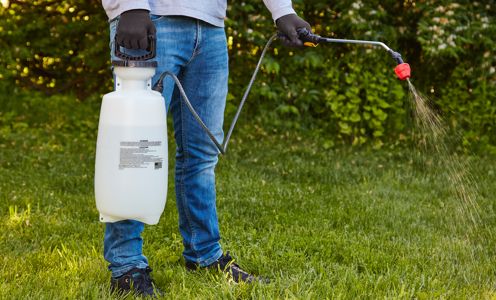
These chemical herbicides can be very tough on your lawn and also the environment, so you want to make sure you get it right the first time. So here are a few tips to keep in mind:
- The right time to apply Bermuda grass killer is in the middle of its active growing season – midsummer.
- Spray combined with a surfactant that will aid the herbicide in sticking to the weeds.
- Always follow the label and recommended dosages – reduce concentration if the lawn is already stressed.
- Pay careful attention to ‘hotspots’ where Bermuda grass likes to grow the most. Where the lawn meets the pavement, areas of full sun, etc.
- Feel free to apply more than once during a season, but space out the applications so there is at least 4 weeks in between treatments.
Chemical-free Methods of Killing Bermuda Grass
If you want to avoid applying chemical solutions to your lawn but are still struggling with a Bermuda grass invasion, there are other ways to get rid of it. Bermuda grass can be choked out or die from over-exposure to the sun using these easy, do-it-yourself methods.
Choking out Bermuda
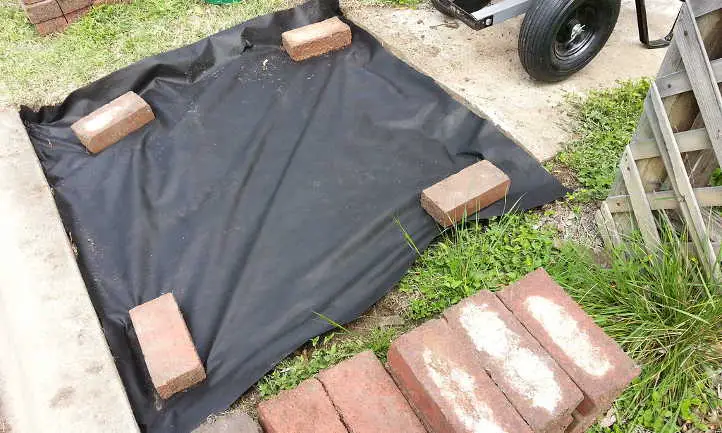
In order to choke out the Bermuda grass entirely, you will need a good, heavy duty landscaping fabric. You can try to cut the fabric in order to match the shape of the patch of Bermuda you are combating, to let your original turf variety breathe.
- Start by cutting the invader grass down as short as possible
- Spread the fabric over the problem area
- Weigh it down thoroughly with a mulch, sand, or bricks along the perimeter
- Be sure that no Bermuda grass can ‘breathe’
- Maintain and monitor progress – add more weight where necessary
- Lift after 2 months and dig up the dead grass – including roots
Pro tip: You can use the same method using pieces of cardboard from around the yard and home, instead of pricey landscaping fabric!
Solarizing
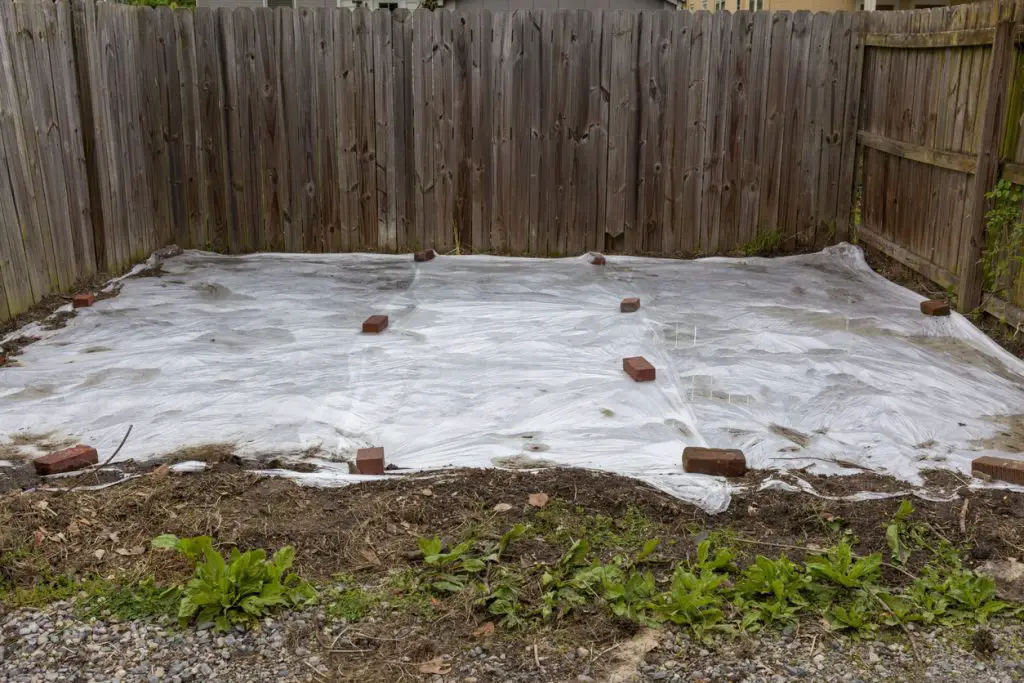
Solarization will over expose your lawn to the sun by using clear plastic as a sort of magnifying glass. Bermuda grass likes the heat, but will not tolerate drought-like conditions – so this is how to recreate them.
- First, mow the lawn short to get as much sun exposure to the roots as possible
- Spread clear, plastic material over the affected areas of your lawn. Be careful to only cover the grass you want gone.
- Weigh down with bricks or stones along the edges of the plastic
- Leave for about 6 weeks in the peak of summer
- The grass should then be ‘fried’ and is ready to uproot
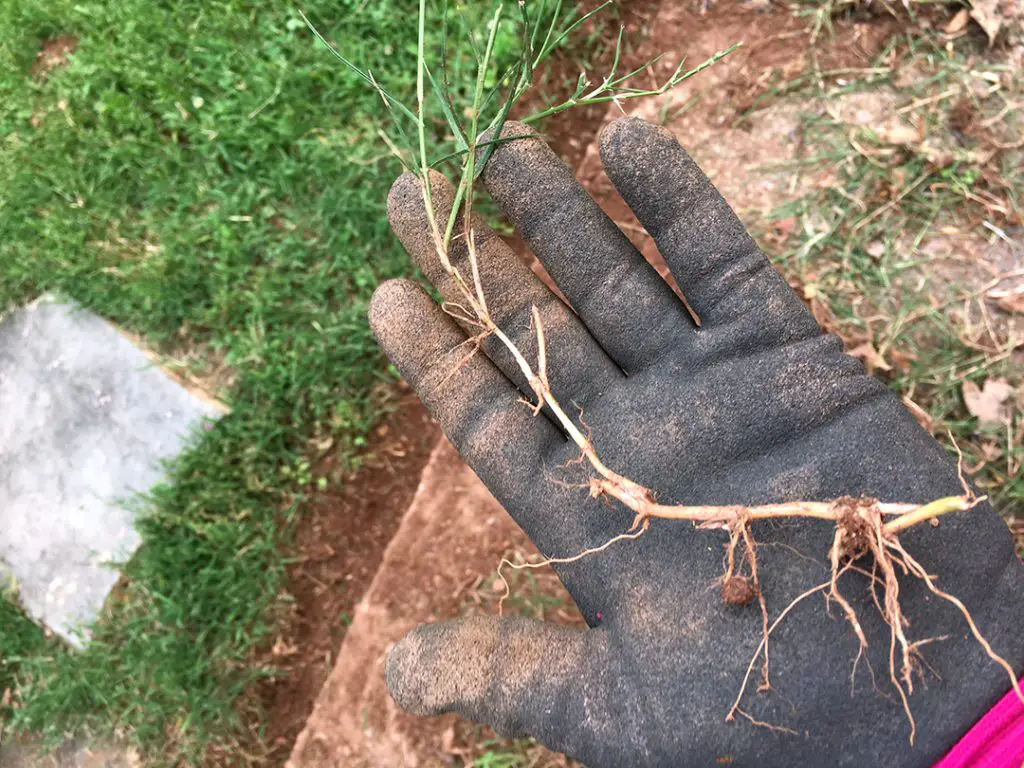
Of course, one can always resort to pulling up Bermuda Grass by hand. This can be a cumbersome and challenging task. Hand weeding is only worth a try if you see a few shots of Bermuda grass in a small area. Make sure to get the entire root out of the soil, so it has no chance of continuing to spread.
Killing Bermuda Grass in Garden Beds
Because Bermuda grass is quick to spread, the stolons or rhizomes can sneak from your yard into your flower beds before you have a chance to stop it. In order to get rid of Bermuda grass in your garden, you are going to want to catch them quickly. Luckily, this is easier to do by hand than in your lawn.
Be sure to find the stolons and trace them back to their original root system. Carefully remove the entire weed without breaking the roots or leaving them in the soil. They WILL grow back in this case!
If this task seems a little daunting or unachievable, use one of the herbicides mentioned above directly on the Bermuda grass until it has died. Be careful of surrounding ornamental plants. Consider covering them in plastic or cardboard while spraying in the area.
Getting Rid of Bermuda Grass is a Process
Keep in mind that no matter what method you choose, getting rid of Bermuda grass in your lawn is a lengthy and tedious process. Most lawns that have had a Bermuda grass problem in the past will never be 100% free of the pest. In the least, it will take several seasons and life cycles to kill off the stubborn perennial grass. Have patience, and make sure to try products recommended for your grass type.
Monitor your lawn carefully so you can stop the spread of Bermuda before it gets completely out of hand. Care for and maintain your lawn with a proper water and feeding schedule in order to keep your grass as healthy as possible – a healthy, thick lawn is the best way to combat unwanted weeds and grasses.
FAQ
What grass will take over Bermuda?
How do you kill Bermuda grass without killing plants?
How do you keep Bermuda grass from spreading?
How do you kill Bermuda grass without chemicals?
Vinegar with a high enough percentage of acidity is another option for killing Bermuda grass without a herbicide, but it still can be dangerous for children and pets, as well as harmful to any plants it comes in contact with.

